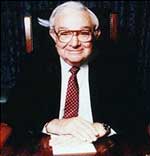Americans have been transfixed these last few days by the passing of a dazzling cultural icon, son of one of the most compelling — and tragic — political figures of the 20th century.

A Green Brown
Far less remarked upon has been the death last week of California Rep. George Brown (D), one of the environmental movement’s “greatest champions,” in the words of the Sierra Club.
Brown spent much of his time during 18 terms in the House pressing environmental issues. His last piece of legislation would have eliminated commercial logging and mining in parts of the Sequoia National Forest.
His passing also opens up a congressional seat long coveted by the GOP but stoutly defended in recent years by the aging Brown, who held on time after time with razor-thin victory margins. The special election to fill the San Bernardino district seat will likely begin with a September open primary, followed by a November runoff if no candidate receives 50 percent of the vote in the primary.
Sierra Club Political Director Dan Weiss expects nothing short of a “special interest feeding” frenzy for the seat. Democrats are hoping to keep the Republican margin in the House to five, following Rep. Michael Forbes‘s (N.Y.) decision to switch from the GOP to the Democratic Party. Republicans, meanwhile, hope to push the margin back to six and grab momentum heading into 2000 by stealing away a Democratic seat.
Beyond the simple partisan jockeying, interest groups will be looking to inject their issues (and their candidates) into the primaries. The Democratic field may include the late rep’s widow Marta Macias Brown.
However, other Dems are waiting in the wings, State Sen. Joe Baca perhaps foremost among them. On the GOP side there is Elia Pirozzi who picked up 40 percent of the vote against Brown last year. The more likely GOP candidate, however, is 1996 nominee Linda Wilde, who came within 1,000 votes of knocking off Brown. The GOP also has a potential wildcard candidate in State Sen. Jim Brulte who has publicly indicated a reluctance to run but is being privately lobbied by GOP officials in Washington and could be the strongest candidate on either side.
One should never underestimate the importance of special elections in setting a tone for the general election battle to come. This has been particularly true of Senate specials (see Wofford-Thornburg ’91, Wyden-Smith ’96), but also of House races, especially in California, the laboratory of American politics.
“Everybody who is going to try and affect the 2000 issues debate is going to use this race as a way to raise their issues,” Sierra Club’s Weiss said. “People are going to want to replace [Brown] with someone who is like-minded, whether it be on labor issues, the choice question, the environment, whatever.”
We will keep our eyes on this one and keep you posted. Should be fun.
Adam Bombed?
Remember the item we ran not long ago on enviro wunderkind Adam Werbach possibly mounting a bid for mayor of San Francisco at the tender age of 26? Well, it looks like you can fughedaboutit, as the saying goes.

Kid Werbach
Word is that Werbach’s out, and insiders say the mini-flurry of stories about his possible candidacy amounted to less than a trial balloon. Perhaps only a trial bubble?
This may come as a disappointment to some Bay Area denizens eager for a candidate who will put the sorry state of San Fran’s public transportation front and center, as Werbach promised to do.
Remaining combatants include Mayor Willie Brown, political consultant Clint Reilly, and former mayor Frank Jordan. Brown remains popular outside the city but his woes continue at home. A recent San Francisco Examiner poll found that 71 percent of city residents disapprove of the way Brown is handling his job, an astronomical figure that would certainly spell death for a lesser pol. With Brown, of course, you never know.
News Roundup
Rep. Forbes’s decision to bolt the GOP actually disappoints some enviros who now have one less green-minded Republican to support and to use to deflect complaints of partisanship. … Look for baseball cards to start popping up in Washington state, courtesy of the Sierra Club, mocking Sen. Slade Gorton‘s (R) enviro record and penchant for slipping riders into big congressional spending bills. … The House Resources Committee passed a resolution Wednesday urging the Army Corps of Engineers not to consider removing river dams in order to save endangered salmon. The resolution is non-binding. The Corps is expected to release results of its five-year study on salmon preservation on the Snake River soon. … Sen. Max Cleland (D-Ga.) is urging senators to sign a letter calling for the removal of a rider on the Interior Department appropriations bill that would end Forest Service monitoring of certain wildlife populations in national parks. … Sen. Richard Bryan (D-Nev.) is preparing to offer an amendment to the Interior appropriations bill that would divert subsidies for logging and road building in national parks to environmental programs.

